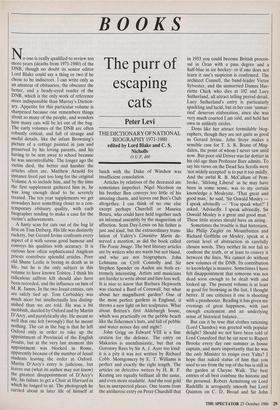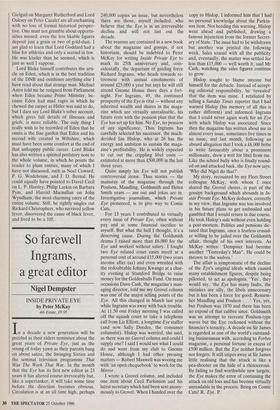BOOKS
The purr of escaping cats
Peter Levi
THE DICTIONARY OF NATIONAL BIOGRAPHY 1971-1980 edited by Lord Blake and C. S. Nicholls O. U.P, £60 No one is really qualified to review ten more years (deaths from 1971-1980) of the DNB, though no doubt its senior editor Lord Blake could say a thing or two if he chose to be indiscreet. I can write only as an amateur of obituaries, the obscurer the better, and a beady-eyed reader of the DNB, which is the only work of reference more indispensible than Murray's Diction- ary. Appetite for this particular volume is sharpened because one remembers things about so many of the people, and wonders how many cats will be let out of the bag. The early volumes of the DNB are often robustly critical, and full of strange and useful details, like the infant Browning's picture of a cottage painted in jam and preserved by his loving parents, and his having to be sent away to school because he was uncontrollable. The longer ago the victim died, the better and harsher the articles often are. Matthew Arnold for instance lived just too long for the original Volume A to include him, and by the time the first supplement gathered him in, he was long enough dead to be severely treated. The ten year supplements we get nowadays have something closer to a con- temporary obituary quality, with each biographer tending to make a case for the victim's achievements.
A hasty scan for cats out of the bag lit first on Tom Driberg. His life was distinctly rackety, but Gerard Irvine confronts every aspect of it with serene good humour and conveys his qualities with accuracy. It is curious how often sophisticated Anglican priests contribute splendid articles. Poor old Shane Leslie is boring in death as in life, but he is the only subject in this volume to have known Tolstoy. I think his ridiculous saffron kilt should also have been recorded, and the influence on him of M. R. James. In the two Jesuit entries, cats are safely tied up. Tom Corbishley was much nicer but intellectually less disting- uished than we are told. He was a bit snobbish, dazzled by Oxford and by Martin D'Arcy, and paralytically shy. He meant so well that one felt (wrongly) that he meant nothing. The cat in the bag is that he left Oxford only in order to take up the appointment of Provincial of the English Jesuits, but at the very last moment this appointment was blocked in Rome, apparently because of the number of Jesuit students leaving the order at Oxford. Martin D'Arcy's entry is judicious, but leaves out (what its author may not know) the greatest disappointment of D'Arcy's life, his failure to get a Chair at Harvard in Which he longed to sit. The photograph he carried about in later life of himself at lunch with the Duke of Windsor was insufficient consolation.
Articles by relatives of the deceased are sometimes imperfect. Nigel Nicolson on his brother Ben conveys too little of his amazing charm, and leaves out Ben's Club altogether. I can think of no one else except perhaps Churchill or Maurice Boura, who could have held together such an informal assembly by the magnetism of affection. Sean Day-Lewis on his father is just and kind, but the extraordinary trans- lation of Valery's Cimetiere Mann de- served a mention, as did the book called The Poetic Image. The best literary articles are by writers who are warm but not bland, and who are not biographers. John Lehmann on Cyril Connolly and Sir Stephen Spender on Auden are both ex- tremely interesting. Artists and musicians are harder to write about and fare less well. It is nice to know that Barbara Hepworth was elected a Bard of Cornwall, but what about her magnificent garden? One of the most perfect gardens in England, it throws a new light on her sculptures. What about Britten's first Aldeburgh house, which was practically on the pebble beach like the fishermen's huts, and full of pebble and water noises day and night?
John Grigg on Edward VIII is a fine oration for the defence. The entry on Makarios is unenthusiastic, but that on Goronwy Rees by Sir A. J. Ayer too kind: it is a pity it was not written by Richard Cobb. Montgomery by E. T. Williams is perfect and exactly the right length. The articles on detective writers by H. R. F. Keating are equally brilliant all the same, and even more readable. And the real gold lies in unexpected places. One learns from the antiheroic entry on Peter Churchill that in 1933 you could become British procon- sul in Oran with a pass degree and a half-blue in ice hockey: or if one does not learn it one's suspicion is confirmed. The architect Connell, the band-leader Victor Sylvester, and the unmarried Dames Har- riette Chick who dies at 102 and Lucy Sutherland, all attract telling period detail. Lucy Sutherland's entry is particularly sparkling and lucid, but in her case 'unmar- ried' deserves elaboration, since she was very much courted I am told, and held her own in unlikely circles.
Dons like her attract formidable biog- raphers, though they are not quite as good as Gerard Irvine. John Stoye makes a sensible case for T. S. R. Boase of Mag- dalen, the point of whom I never saw until now. But poor old Driver was far dottier in his old age than Professor Barr admits. To say his views on the Dead Sea Scrolls were 'not widely accepted' is to put it too mildly. And the awful R. B. McCallum of Pem- broke, 'lifelong Liberal' as he may have been in some sense, was to my certain knowledge a Mosleyite. 'That great and good man,' he said, 'Sir Oswald Mosley — I speak advisedly —"You speak what?' I asked. 'Advisedly. I speak advisedly, Sir Oswald Mosley is a great and good man.' These little stories should have an airing.
Sometimes the trouble is that historians, like Philip Ziegler on Mountbatten and Richard Griffiths on Mosley, speak at a certain level of abstraction in carefully chosen words. They neither lie nor fail to confront the truth, or at least to convey it between the lines. We cannot do without new volumes of the DNB. Its contribution to knowledge is massive. Sometimes I have felt disappointment that someone was not dead soon enough to be dealt with and looked up. The present volume is at least as good for browsing as the last, I thought better. If one criticises it one is shooting with a peashooter. Reading it has given me evenings of great happiness, with just enough excitement and an underlying sense of historical balance.
But can it be true that clothes rationing (Lord Chandos) was greeted with popular delight? Should we not have been told of Lord Conesford that he sat next to Rupert Brooke every day one summer as house captain, and more importantly that he was the only Minister to resign over Yalta? I hope that naked statue of him that you used to see from the top of the bus is still in the garden at Cheyne Walk. The best entries of all best combine the historic and the personal. Robert Armstrong on Lord Radcliffe is arrogantly smooth but Lord Quinton on C. D. Broad and Sir John Gielgud on Margaret Rutherford and Lord Oaksey on Peter Cazalet are all enchanting with no loss of formal historical perspec- tive. One must not grumble about opportu- nities missed: even the less likable figures deposit just a grain or two of gold-dust. I am glad to learn that Lord Goddard had a blue for athletics and only a second in law. He was kinder than he seemed, which is just as well I suppose.
Lord Blake himself contributes the arti- cle on Eden, which is in the best tradition of the DNB and outshines anything else I have read about that strange man. Michael Astor told me he resigned from Parliament when Eden became Prime Minister, be- cause Eden had mad rages in which he chewed the carpet as Hitler was said to do, but I dare say Lord Blake's sober account, which gives full details of illnesses and griefs, is more reliable. The only thing I really wish to be recorded of Eden that he omits is the fine garden that Eden and his second wife created in Wiltshire, which must have been some comfort at the end of that unhapppy public career. Lord Blake has also written a spirited prefatory note to the whole volume, in which he points the reader to plum entries, many of which I have not discussed, such as Noel Coward, P. G. Wodehouse, and J. D. Bernal. He could equally have pointed to David Cecil on L. P. Hartley, Philip Larkin on Barbara Pym, and Harold Macmillan on John Wyndham, the most charming entry of the entire volume. Still, he rightly singles out Rickard Christophers, who survived yellow fever, discovered the cause of black fever, and lived to be a 105.



























































 Previous page
Previous page